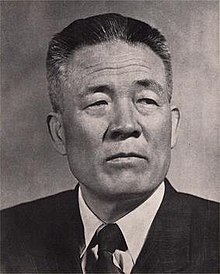Han Sorya
| Han Sorya | |
|---|---|
 |
|
| Born | Han Pyŏngdo 3 August 1900 Hamhung |
| Died | 6 April 1976 |
| Resting place | Patriotic Martyrs' Cemetery |
| Occupation | novelist, short story writer, literary administrator, politician |
| Language | Korean |
| Nationality | Korean |
| Alma mater | Nippon University |
| Period | 20th century |
| Literary movement | Proletarian literature |
| Notable works | Jackals, History |
| Notable awards | Order of the National Flag (second class, 1951),People's Prize (History, 1958), title of People's Artist (1958) |
| Korean name | |
| Chosŏn'gŭl | |
| Hancha | |
| Revised Romanization | Han Seol-ya |
| McCune–Reischauer | Han Sŏrya |
|
|
|
Han Sorya (Korean: 한설야, born Han Pyŏngdo; 3 August 1900 – 6 April 1976) was a Korean writer, literary administrator and politician who spent much of his career in North Korea. Regarded as one of the most important fiction writers in North Korean history, Han also ran the entire North Korean literary scene as the head of the Korean Writers' Union and minister of education.
During his career, Han survived a number of purges that were caused by factional strife within the Workers' Party. Han, motivated by personal grievances against his rival writers, sometimes acted as the force behind the purges within the cultural establishment as well. Han himself was purged in 1962. In his works, Han offered some of the earliest known contributions to the cult of personality of Kim Il-sung. His influence is felt in North Korea even today, though his name has been forgotten from official histories. Han's best known work, the anti-American novella Jackals, however, has been invoked in the 2000s.
Han was born on 3 August 1900 in Hamhung, in the north of Korea. His father was a county magistrate. He graduated from middle school in 1919 and attended Nippon University in Tokyo from 1921 to 1924, studying sociology. He emigrated to Manchuria in 1925 but returned to Seoul in the south in 1927. In 1944, he returned to his native Hamhung. After the liberation of Korea he settled in Pyongyang.
Han was one of the most prominent fiction writers in the history of North Korean literature. During his career, Han earned the official title of "the greatest writer of modern Korean literature", which he shared with Yi Kiyŏng, and was called a "living classic". Han's career was at its height from 1955 to 1957. Han, along with Kim Tu-bong, shaped North Korea's cultural policies.
...
Wikipedia
